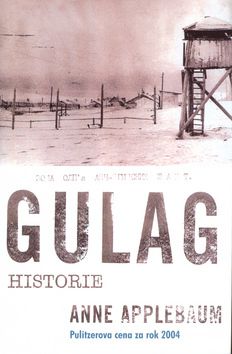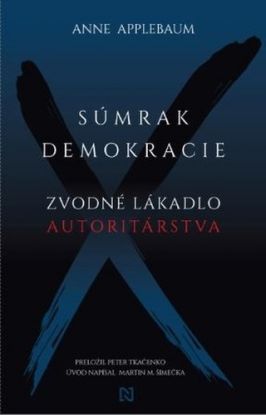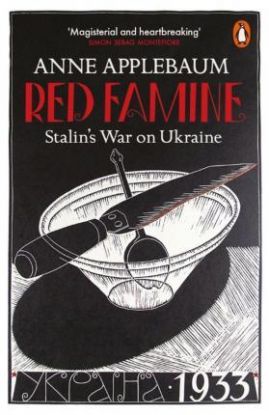Anne Applebaum
autor
Gulag
Gulag obrovské množství sovětských koncentračních táborů byl systém represí a trestů, jehož racionalizované zlo a institucionalizovaná nelidskost soutěžily s holocaustem.
Do světového povědomí vstoupil Gulag v roce 1972, poté, co vyšla rozsáhlá p
ráce, kterou z vyprávění o sovětských táborech sestavil Alexandr Solženicyn Souostroví Gulag. Od zhroucení Sovětského svazu byly v Rusku i na Západě uveřejněny desítky memoárů a nových studií, zabývajících se různými aspekty tohoto systému. Anne Ap
plebaum nyní předkládá s použitím těchto nových pramenů i svých původních historických výzkumů první plně zdokumentované dějiny systému sovětských táborů od jeho počátků za ruské revoluce po rozpad v době glasnosti. Její kniha je velikým badatelský
m výkonem a morálním zúčtováním, které umisťuje Gulag tam, kam patří: do centra našeho porozumění komplikovaným dějinám 20. století.
Twilight of Democracy
Anne Applebaum is a leading historian of communism and a penetrating investigator of contemporary politics. Here she sets her sights on the big question, one with which she herself has been deeply engaged in both Europe and America: how did our democracy go wrong? This extraordinary document, written with urgency, intelligence and understanding, is her answer. Timothy Snyder
Friendships torn. Ideals betrayed. Alliances broken. In this, her most personal book, a great historian explains why so many of those who won the battles for democracy or have spent their lives proclaiming its values are now succumbing to liars, thugs and crooks. Analysis, reportage and memoir, Twilight of Democracy fearlessly tells the shameful story of a political generation gone bad. David Frum
In the years just before and after the fall of the Berlin Wall, people from across the political spectrum in Europe and America celebrated a great achievement, felt a common purpose and, very often, forged personal friendships. Yet over the following decades the euphoria evaporated, the common purpose and centre ground gradually disappeared, extremism rose once more and eventually - as this book compellingly relates - the relationships soured too.
Anne Applebaum traces this history in an unfamiliar way, looking at the trajectories of individuals caught up in the public events of the last three decades. When politics becomes polarized, which side do you back? If you are a journalist, an intellectual, a civic leader, how do you deal with the re-emergence of authoritarian or nationalist ideas in your country? When your leaders appropriate history, or pedal conspiracies, or eviscerate the media and the judiciary, do you go along with it?
Twilight of Democracy is an essay that combines the personal and the political in an original way and brings a fresh understanding to the dynamics of public life in Europe and America, both now and in the recent past.
Súmrak demokracie
Denník N vydáva prvú zo svojich prekladových kníh. Jej zásadná otázka znie: Čo sa stalo s našou demokraciou? Prečo ľudí tak priťahujú nacionalizmus, autokracie a politické systémy, ktoré hlásajú jednoduché a radikálne riešenia? Ako despotickí lídri do svojich súkolí zapájajú intelektuálov, bez ktorých by ich vláda nebola možná? Odpoveď prináša kniha Súmrak demokracie od Anne Applebaumovej, ktorá vychádza v knižnej edícii Denníka N v preklade Petra Tkačenka. Uznávaná americká historička a novinárka, ocenená Pulitzerovou cenou za knihu Gulag, sa venuje politickým režimom východnej Európy, ale aj americkej či anglickej politike. Patrí medzi novinárov, ktorí ako prví upozornili na antidemokratické trendy na Západe a v tejto podmanivej eseji skúma príťažlivosť diktátorských foriem vlády.
Liberálna demokracia je v Británii, kontinentálnej Európe, v USA aj v ďalších krajinách pod paľbou kritiky, zatiaľ čo autoritárstvo je na vzostupe. Anne Applebaum vysvetľuje, prečo sa elity v demokratických krajinách začali prikláňať k nacionalizmu a autoritárstvu. Opisuje nových advokátov iliberalizmu a ukazuje, ako na zmenu spoločenského poriadku využívajú konšpiračné teórie, politickú polarizáciu, sociálne médiá, ba aj nostalgiu. Despotickí lídri totiž nevládnu sami spoliehajú sa na svojich politických spojencov, úradníkov a mediálne osobnosti, ktoré im dláždia cestu a podporujú ich vládu.
dostupné aj ako:
Vörös éhínség - Sztálin háborúja Ukrajna ellen
Valósághű beszámoló Sztálin napjainkig ható, kegyetlen tervéről, mely több millió ember életébe került.
Sztálin 1929-ben hirdette meg a mezőgazdaság - hatásait tekintve egy második szovjet forradalommal felérő - kollektivizációját, amely parasztok millióit kényszerítette, hogy a földjükről lemondva belépjenek a kolhozokba. Az eredmény katasztrofális éhínség volt, amely a legtöbb halálos áldozatot követelte az európai történelemben. 1931 és 1933 között legalább ötmillió ember halt meg a Szovjetunióban. A szovjet állam azonban segítségnyújtás helyett arra használta a katasztrófát, hogy megszabaduljon egy politikai problémától. Anne Applebaum a Vörös éhínség-ben azt állítja, hogy az áldozatok közül több mint hárommillió ukrán volt, akik nem egy rossz politika véletlenszerű áldozataiként vesztek oda, hanem azért, mert az állam tudatosan pusztulásra ítélte őket.
A szerző bizonyítékokkal szolgál egy régóta fennálló gyanúra: miután Ukrajnában a szovjethatalmat lázadások sora tette ingataggá,
Sztálin úgy döntött, hogy elpusztítja az ukrán parasztságot.
Az állam lezárta a köztársaság határait, és elkobzott minden hozzáférhető élelmiszert. Gyorsan bekövetkezett az éhínség, és az emberek megettek bármit: füvet, fakérget, kutyákat, elhullott állatokat. Némelykor egymást ölték, hogy élelemhez jussanak.
Applebaum műve lebilincselő olvasmány; felidézi a huszadik század legsúlyosabb bűncselekményeinek egyikét, és bemutatja, miképpen jelenthet ismét fenyegetést, immár a huszonegyedik század politikai rendjére.
A könyv letaglózó erővel, precízen írja le az iszonyatot, amelyben a rendkívüli gonoszságot túlélni igyekvő embereknek részük volt.
Soumrak demokracie - Svůdná přitažlivost autoritářství
Renomovaná americká novinářka a historička se ve své nejnovější knize věnuje znepokojivému fenoménu posledních let – antidemokratickým trendům, které jsou stále patrnější jak ve východní a západní Evropě, tak i ve Spojených státech. Anne Applebaumová patří k prvním autorům, kteří ve svých novinových článcích na tuto skutečnost upozornili. V knize vysvětluje, proč se elity v demokratických státech začaly přiklánět k nacionalismu a autoritářství. Na známých příkladech ukazuje příchod nové vlny zastánců iliberalismu a popisuje, jak ke změně společenského pořádku tito lidé využívají konspirační teorie, politickou polarizaci, sociální média, a dokonce i nostalgii. Autoritativní vůdci moderní doby nejsou osamělými diktátory, při svém vládnutí se spoléhají na politické spojence, loajální úředníky či mediálně známé osobnosti, které jim pomáhají vydláždit cestu a podporují jejich vzestup. A na oplátku tyto své spojence odměňují participací na moci a bohatství.
Súmrak demokracie
Denník N vydáva prvú zo svojich prekladových kníh. Jej zásadná otázka znie: Čo sa stalo s našou demokraciou? Prečo ľudí tak priťahujú nacionalizmus, autokracie a politické systémy, ktoré hlásajú jednoduché a radikálne riešenia? Ako despotickí lídri do svojich súkolí zapájajú intelektuálov, bez ktorých by ich vláda nebola možná? Odpoveď prináša kniha Súmrak demokracie od Anne Applebaumovej, ktorá vychádza v knižnej edícii Denníka N v preklade Petra Tkačenka. Uznávaná americká historička a novinárka, ocenená Pulitzerovou cenou za knihu Gulag, sa venuje politickým režimom východnej Európy, ale aj americkej či anglickej politike. Patrí medzi novinárov, ktorí ako prví upozornili na antidemokratické trendy na Západe a v tejto podmanivej eseji skúma príťažlivosť diktátorských foriem vlády.
Liberálna demokracia je v Británii, kontinentálnej Európe, v USA aj v ďalších krajinách pod paľbou kritiky, zatiaľ čo autoritárstvo je na vzostupe. Anne Applebaum vysvetľuje, prečo sa elity v demokratických krajinách začali prikláňať k nacionalizmu a autoritárstvu. Opisuje nových advokátov iliberalizmu a ukazuje, ako na zmenu spoločenského poriadku využívajú konšpiračné teórie, politickú polarizáciu, sociálne médiá, ba aj nostalgiu. Despotickí lídri totiž nevládnu sami – spoliehajú sa na svojich politických spojencov, úradníkov a mediálne osobnosti, ktoré im dláždia cestu a podporujú ich vládu.
Na stiahnutie
11,90 €
dostupné aj ako:
Červený hladomor
V rokoch 1932 – 1933 zomreli takmer štyri milióny Ukrajincov, ktorých nechal vtedajší režim vyhladovať. Hladomor však predstavoval len polovicu príbehu. V čase, keď na vidieku umierali roľníci, zároveň sovietska tajná polícia zaútočila aj na ukrajinské intelektuálne a politické elity. Kým sa hlad šíril, rozbehla sa ohováračská kampaň a represie namierené proti ukrajinským intelektuálom, profesorom, kurátorom v múzeách, spisovateľom, výtvarníkom, duchovným, teológom, štátnym zamestnancom a úradníkom.
Novinárka a spisovateľka Anne Applebaum detailne opisuje, ako sa to vôbec mohlo stať, kto bol za túto tragédiu zodpovedný a aké mala následky. Informácie čerpá z množstva archívnych materiálov a zo spomienok preživších, ale aj z prác ukrajinských vedcov. Ponúka svedectvá tých, ktorí prežili, a vykresľuje, čo dokážu ľudské bytosti, keď ich hlad privedie k šialenstvu. Ukazuje, ako nemilosrdne sovietsky štát využíval propagandu, aby poštval susedov proti sebe a vyhladil údajné protirevolučné živly.
Po hladomore nasledoval útok na ukrajinské kultúrne a politické vedenie. Sovietsky zväz zároveň poprel, že k hladomoru vôbec niekedy došlo. Sovietske orgány boli rozhodnuté, že Ukrajina by sa mala vzdať svojich národných ašpirácií a mala by byť pochovaná aj skutočná história krajiny spolu s miliónmi obetí. Kniha Červený hladomor je tragickou stigmou v dejinách dvadsiateho storočia, ale aj spomienkou na tých, ktorí sa stali terčom Stalinovho cieleného štátneho teroru.
dostupné aj ako:
Červený hladomor
V rokoch 1932 – 1933 zomreli takmer štyri milióny Ukrajincov, ktorých nechal vtedajší režim vyhladovať. Hladomor však predstavoval len polovicu príbehu. V čase, keď na vidieku umierali roľníci, zároveň sovietska tajná polícia zaútočila aj na ukrajinské intelektuálne a politické elity. Kým sa hlad šíril, rozbehla sa ohováračská kampaň a represie namierené proti ukrajinským intelektuálom, profesorom, kurátorom v múzeách, spisovateľom, výtvarníkom, duchovným, teológom, štátnym zamestnancom a úradníkom.
Novinárka a spisovateľka Anne Applebaum detailne opisuje, ako sa to vôbec mohlo stať, kto bol za túto tragédiu zodpovedný a aké mala následky. Informácie čerpá z množstva archívnych materiálov a zo spomienok preživších, ale aj z prác ukrajinských vedcov. Ponúka svedectvá tých, ktorí prežili, a vykresľuje, čo dokážu ľudské bytosti, keď ich hlad privedie k šialenstvu. Ukazuje, ako nemilosrdne sovietsky štát využíval propagandu, aby poštval susedov proti sebe a vyhladil údajné protirevolučné živly.
Po hladomore nasledoval útok na ukrajinské kultúrne a politické vedenie. Sovietsky zväz zároveň poprel, že k hladomoru vôbec niekedy došlo. Sovietske orgány boli rozhodnuté, že Ukrajina by sa mala vzdať svojich národných ašpirácií a mala by byť pochovaná aj skutočná história krajiny spolu s miliónmi obetí. Kniha Červený hladomor je tragickou stigmou v dejinách dvadsiateho storočia, ale aj spomienkou na tých, ktorí sa stali terčom Stalinovho cieleného štátneho teroru.
Na stiahnutie
16,90 €
dostupné aj ako:
Gulag a history
This landmark book uncovers for the first time in detail one of the greatest horrors of the twentieth century: the vast system of Soviet camps that were responsible for the deaths of countless millions. "Gulag" is the only major history in any language to draw together the mass of memoirs and writings on the Soviet camps that have been published in Russia and the West. Using these, as well as her own original research in NKVD archives and interviews with survivors, Anne Applebaum has written a fully documented history of the camp system: from its origins under the tsars, to its colossal expansion under Stalin's reign of terror, its zenith in the late 1940s and eventual collapse in the era of glasnost. It is a gigantic feat of investigation, synthesis and moral reckoning.
Vypredané
18,00 €
18,95 €
Iron Curtain
In the long-awaited follow-up to her Pulitzer Prize-winning "Gulag," acclaimed journalist Anne Applebaum delivers a groundbreaking history of how Communism took over Eastern Europe after World War II and transformed in frightening fashion the individuals who came under its sway. At the end of World War II, the Soviet Union to its surprise and delight found itself in control of a huge swath of territory in Eastern Europe. Stalin and his secret police set out to convert a dozen radically different countries to Communism, a completely new political and moral system. In "Iron Curtain," Pulitzer Prize-winning journalist Anne Applebaum describes how the Communist regimes of Eastern Europe were created and what daily life was like once they were complete. She draws on newly opened East European archives, interviews, and personal accounts translated for the first time to portray in devastating detail the dilemmas faced by millions of individuals trying to adjust to a way of life that challenged their every belief and took away everything they had accumulated. Today the Soviet Bloc is a lost civilization, one whose cruelty, paranoia, bizarre morality, and strange aesthetics Applebaum captures in the electrifying pages of "Iron Curtain."
Vypredané
19,48 €
20,50 €
Iron Curtain
At the end of the Second World War, the Soviet Union unexpectedly found itself in control of a huge swathe of territory in Eastern Europe. Stalin and his secret police set out to convert a dozen radically different countries to a completely new political and moral system: Communism. Anne Applebaum's landmark history of this brutal time shows how societies were ruthlessly eviscerated by Communist regimes, how opposition was destroyed and what life was like for ordinary people who had to choose whether to fight, to flee or to collaborate.A haunting reminder of how fragile freedom can be, Iron Curtain is an exceptional work of historical and moral reckoning.
Vypredané
17,58 €
18,50 €
Železná opona
Po skončení druhé světové války dochází k novému politickému i faktickému rozdělení evropského kontinentu. Hlavním strůjcem změn je Sovětský svaz, pod jehož důslednou kontrolou se postupně ocitá velká část východní a střední Evropy. Stalin a jeho tajná policie se všemi prostředky snaží přetransformovat tucet rozdílných zemí do jednotného politického a ideologického systému – komunismu. Anne Applebaumová, držitelka Pulitzerovy ceny za knihu Gulag, ve svém novém díle popisuje vznik komunistických režimů a do detailu líčí každodenní život za železnou oponou.
Vypredané
24,51 €
25,80 €
Between East and West
This book offers a vivid and human glimpse into Europe's borderlands as they emerged from Soviet rule - back in print after nearly 20 years. "In this superb book, in which one senses the spirit of Franz Kafka and Bruno Schulz, the dramatic world of the Eastern borderlands comes to life." (Ryszard Kapuscinski). As Europe's borderlands emerged from Soviet rule, Anne Applebaum travelled from the Baltic to the Black Sea, through Lithuania, Belarus, Ukraine and the Carpathian mountains. Rich in vivid characters and stories of tragedy and survival, Between East and West illuminates the soul of a place, and the secret history of its people. "A beautifully written and thought-provoking account of a journey along Europe's forgotten edge." (Timothy Garton Ash). "A vivid and penetrating assessment of the lands between the Baltic and the Black Sea in all their drama and desolation...a wise and useful book." (Robert Conquest). "Combines the excitement of a well-written and adventurous travelogue with sophisticated reportage." (Norman Davies). "You will be totally absorbed." (Norman Stone). Anne Applebaum is a historian and journalist, a regular columnist for the Washington Post and Slate, and the author of several books, including Gulag: a history, which won the 2004 Pulitzer Prize for non-fiction, and Iron Curtain, which in 2013 won the Duke of Westminster Medal for Military Literature and the Cundill Prize in Historical Literature. She is the Director of Political Studies at the Legatum Institute in London, and she divides her time between Britain and Poland, where her husband, Radek Sikorski, serves as Foreign Minister.
Vypredané
16,10 €
16,95 €
Red Famine - Stalin's War on Ukraine
The momentous new book from the Pulitzer Prize-winning author of Gulag and Iron Curtain. In 1932-33, nearly four million Ukrainians died of starvation, having been deliberately deprived of food. It is one of the most devastating episodes in the history of the twentieth century. With unprecedented authority and detail, Red Famine investigates how this happened, who was responsible, and what the consequences were. It is the fullest account yet published of these terrible events.The book draws on a mass of archival material and first-hand testimony only available since the end of the Soviet Union, as well as the work of Ukrainian scholars all over the world. It includes accounts of the famine by those who survived it, describing what human beings can do when driven mad by hunger. It shows how the Soviet state ruthlessly used propaganda to turn neighbours against each other in order to expunge supposedly 'anti-revolutionary' elements. It also records the actions of extraordinary individuals who did all they could to relieve the suffering.The famine was rapidly followed by an attack on Ukraine's cultural and political leadership - and then by a denial that it had ever happened at all. Census reports were falsified and memory suppressed. Some western journalists shamelessly swallowed the Soviet line; others bravely rejected it, and were undermined and harassed. The Soviet authorities were determined not only that Ukraine should abandon its national aspirations, but that the country's true history should be buried along with its millions of victims. Red Famine, a triumph of scholarship and human sympathy, is a milestone in the recovery of those memories and that history. At a moment of crisis between Russia and Ukraine, it also shows how far the present is shaped by the past.
Vypredané
29,93 €
31,50 €
Red Famine - Stalin's War on Ukraine
Winner of the Duff Cooper and Lionel Gelber prizes
In 1932-33, nearly four million Ukrainians died of starvation, having been deliberately deprived of food. It is one of the most devastating episodes in the history of the twentieth century. With unprecedented authority and detail, Red Famine investigates how this happened, who was responsible, and what the consequences were. It is the fullest account yet published of these terrible events.
The book draws on a mass of archival material and first-hand testimony only available since the end of the Soviet Union, as well as the work of Ukrainian scholars all over the world. It includes accounts of the famine by those who survived it, describing what human beings can do when driven mad by hunger. It shows how the Soviet state ruthlessly used propaganda to turn neighbours against each other in order to expunge supposedly 'anti-revolutionary' elements. It also records the actions of extraordinary individuals who did all they could to relieve the suffering.
The famine was rapidly followed by an attack on Ukraine's cultural and political leadership - and then by a denial that it had ever happened at all. Census reports were falsified and memory suppressed. Some western journalists shamelessly swallowed the Soviet line; others bravely rejected it, and were undermined and harassed. The Soviet authorities were determined not only that Ukraine should abandon its national aspirations, but that the country's true history should be buried along with its millions of victims. Red Famine, a triumph of scholarship and human sympathy, is a milestone in the recovery of those memories and that history. At a moment of crisis between Russia and Ukraine, it also shows how far the present is shaped by the past.
Rudý hladomor
V roce 1929 Stalin zahájil proces zemědělské kolektivizace, která se v podstatě stala druhou ruskou revolucí. Miliony větších i menších zemědělců byly postupně přinuceny odevzdat svou půdu nově vytvořeným agrárním podnikům – družstevním kolchozům nebo státním sovchozům. Tragickým důsledkem kolektivizace byl propad zemědělské výroby následovaný smrtícím hladomorem, jaký nemá v evropské historii obdoby. Mezi lety1931 a 1933 v Sovětském svazu zemřelo hladem nejméně pět miliónů lidí. Sovětské vedení však pomoc obyvatelstvu v dotčených oblastech záměrně neposkytlo a tragédii naopak využívalo ke svým politickým cílům. A jak konstatuje autorka, téměř dvě třetiny z celkového počtu mrtvých byli Ukrajinci, kteří nezahynuli vinou chybné hospodářské politiky, nýbrž se stali oběťmi Stalinova cíleného státního teroru.
Vypredané
20,94 €
22,04 €






















